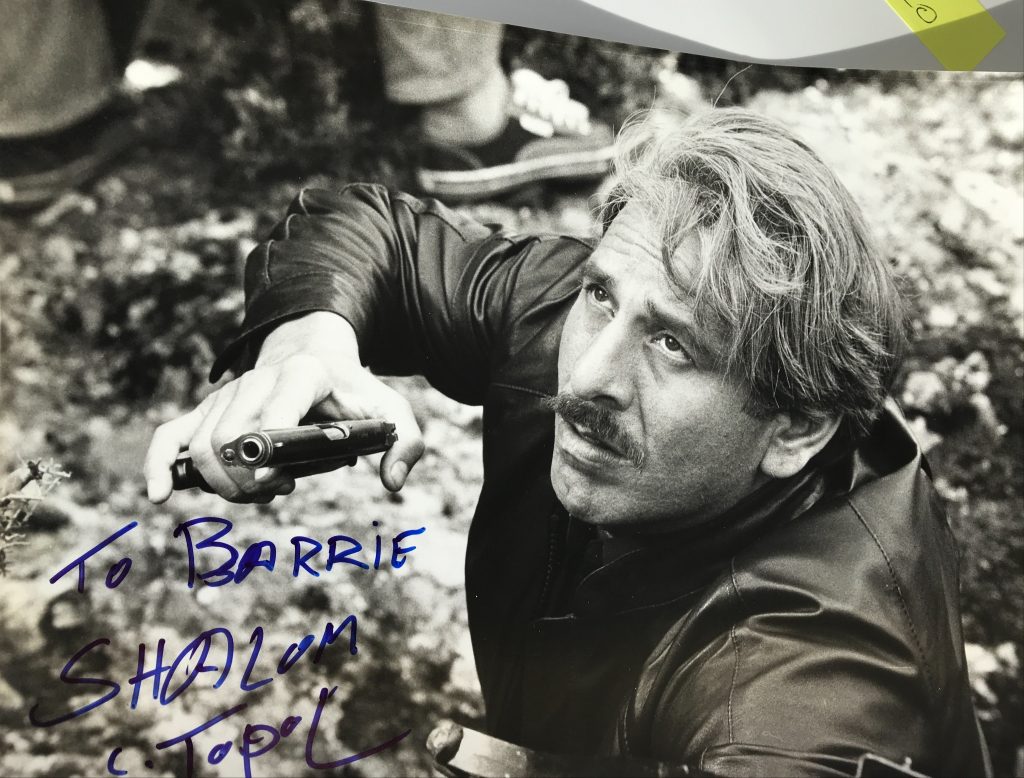
Topol. Wikipedia
Chaim Topol (Hebrew: חיים טופול, born September 9, 1935), also known as Topol, is an Israeliactor, singer, comedian, voice artist, film producer, author, and illustrator. He is best known for his portrayal of Tevye the Dairyman, the lead role in the musical Fiddler on the Roof, on both stage and screen, having performed this role more than 3,500 times in shows and revivals from the late 1960s through to 2009.
Topol began his acting career during his Israeli army service in the Nahal entertainment troupe, and later toured Israel with kibbutz theatre and satirical theatre companies. He was a co-founder of the Haifa Theatre. His breakthrough film role came in 1964 as the title character in Sallah Shabati, by Israeli writer Ephraim Kishon, for which he won a Golden Globe for Most Promising Newcomer—Male. Topol went on to appear in more than 30 films in Israel and the United States, including Galileo (1975), Flash Gordon (1980) and For Your Eyes Only(1981). He was described as Israel’s only internationally recognized entertainer from the 1960s through 1980s. He won a Golden Globe for Best Actor and was nominated for an Academy Award for Best Actor for his 1971 film portrayal of Tevye, and was nominated for a Tony Award for Best Actor for a 1991 Broadway revival of Fiddler on the Roof.
He is a founder of Variety Israel, an organization serving children with special needs, and Jordan River Village, a year-round camp for Arab and Jewish children with life-threatening illnesses, for which he serves as chairman of the board. In 2015 he was awarded the Israel Prize for lifetime achievement.
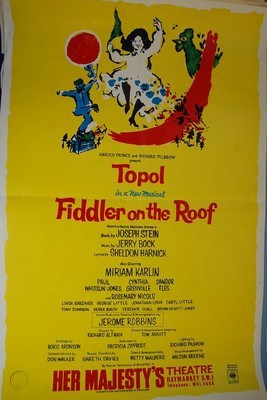
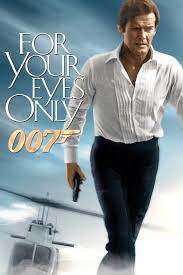
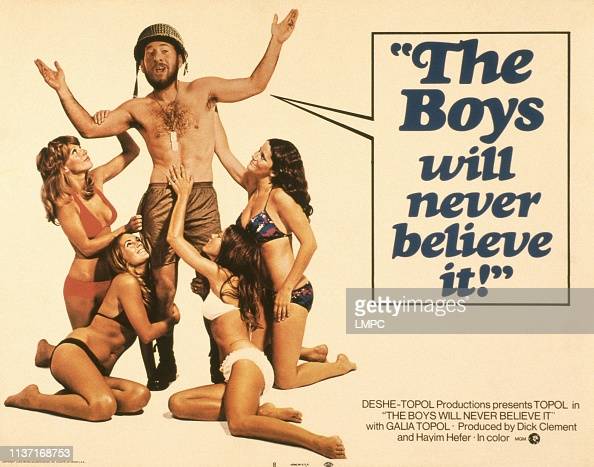
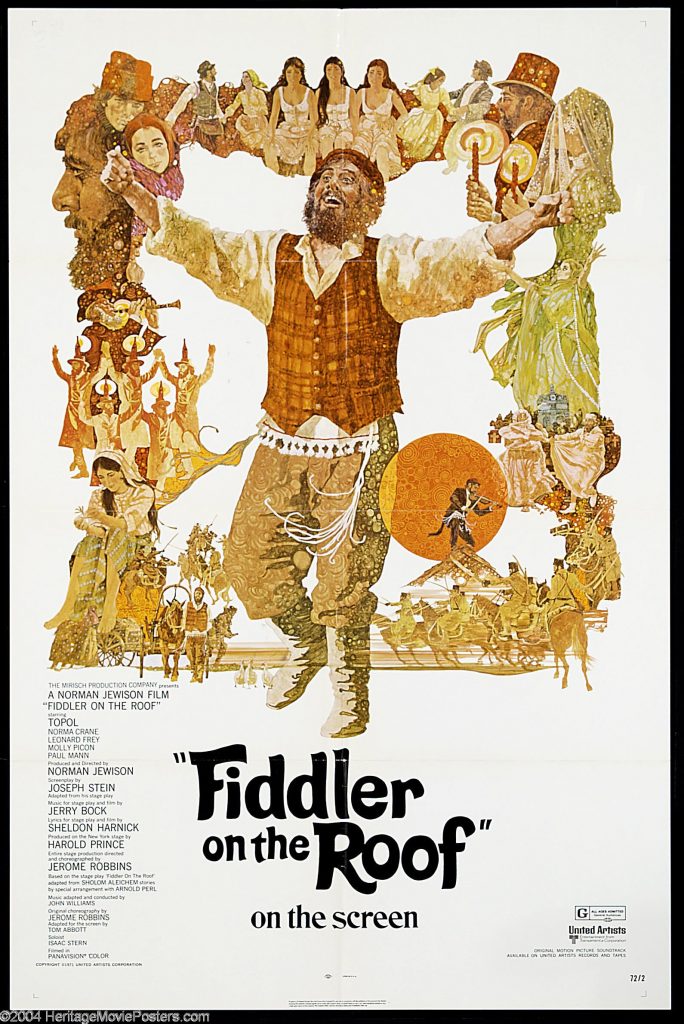
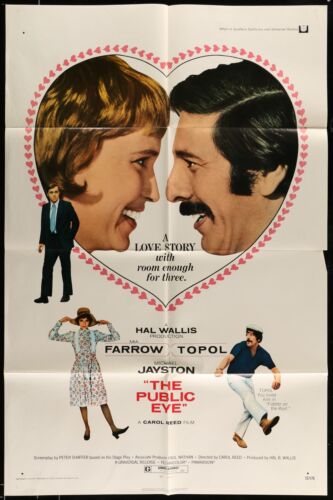
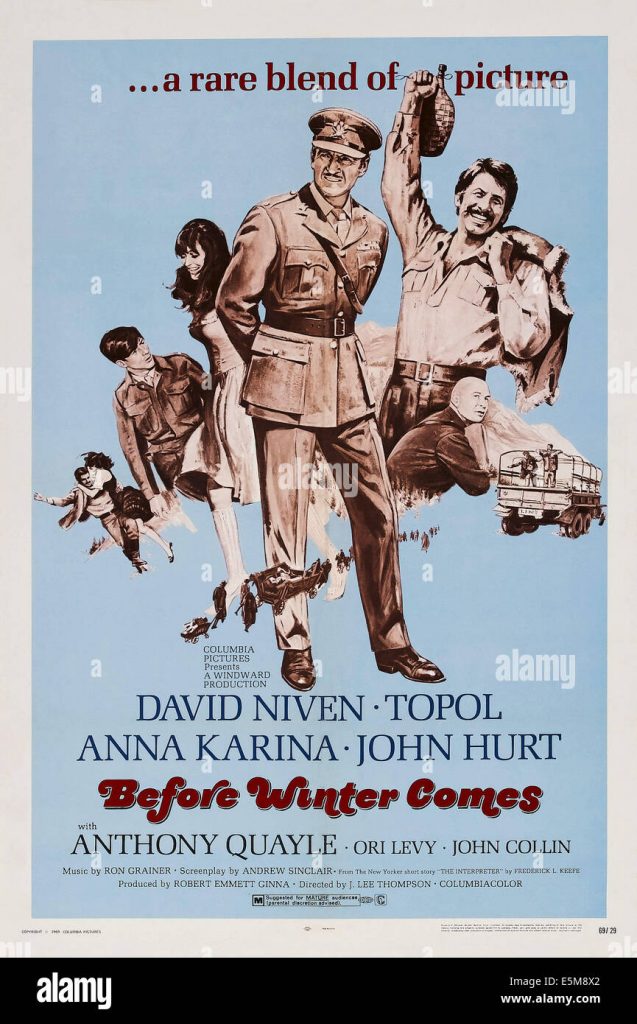
Topol was born on September 9, 1935 in Tel Aviv, in what was then Mandatory Palestine (now Israel). His father, Jacob Topol, had immigrated to Mandatory Palestine from Russia in the early 1930s and worked as a plasterer; His mother, Rel (née Goldman) Topol, was a seamstress. Although the young Chaim wanted to become a commercial artist, his elementary school teachers saw a theatrical side to him, and encouraged him to act in school plays and read stories to the class.
At age 14 he began working as a printer at the Davar newspaper while pursuing his high school studies at night. He graduated high school at age 17 and moved to Kibbutz Geva. A year later, he enlisted in the Israeli army and became a member of the Nahal entertainment troupe, singing and acting in traveling shows. He rose in rank to troupe commander.
Twenty-three days after being discharged from military service on October 2, 1956, and two days after marrying Galia Finkelstein, a fellow Nahal troupe member, Topol was called up for reserve duty in the Sinai Campaign. He performed for soldiers stationed in the desert. After the war, he and his wife settled in Kibbutz Mishmar David, where Topol worked as a garage mechanic. Topol assembled a kibbutz theatre company made up of friends from his Nahal troupe; the group toured four days a week, worked on their respective kibbutzim for two days a week, and had one day off. The theatre company was in existence from early 1957 to the mid-1960s. Topol both sang and acted with the group, doing both “loudly”.
Between 1960 and 1964, Topol performed with the Batzal Yarok (“Green Onion”) satirical theatre company, which also toured Israel. Other members of the group included Uri Zohar, Nechama Hendel, Zaharira Harifai, Arik Einstein, and Oded Kotler. In 1960, Topol co-founded the Haifa Municipal Theatre with Yosef Milo, serving as assistant to the director and acting in plays by Shakespeare, Ionesco, and Brecht. In 1965 he performed in the Cameri Theatre in Tel Aviv.
Topol’s sketch of himself as Sallah ShabatiHaim Topol, then a young man and of Ashkenazi heritage, plays the old Sephardic manipulator with such consummate skill that even aged immigrants from Morocco and Tunisia were convinced that he was one of them.
Topol’s first film appearance was in the 1961 film I Like Mike, followed by the 1963 Israeli film El Dorado. His breakthrough role came as the lead character in the 1964 film Sallah Shabati. Adapted for the screen by Ephraim Kishon from his original play, the social satire depicts the hardships of a Mizrahi Jewish immigrant family in Israel in the 1950s, satirizing “just about every pillar of Israeli society: the Ashkenazi establishment, the pedantic bureaucracy, corrupt political parties, rigid kibbutz ideologues and … the Jewish National Fund‘s tree-planting program”. Topol, who was 29 during the filming, was familiar playing the role of the family patriarch, having performed skits from the play with his Nahal entertainment troupe during his army years.[3][10]He contributed his own ideas for the part, playing the character as a more universal Sephardi Jew instead of specifically a Yemenite, Iraqi, or Moroccan Jew, and asking Kishon to change the character’s first name from Saadia (a recognizably Yemenite name) to Sallah (a more general Mizrahi name).
The film won the Golden Globe Award for Best Foreign Language Film, and Topol won the 1964 Golden Gate Award for Best Actor at the San Francisco International Film Festival and the 1965 Golden Globe for Most Promising Newcomer—Male.[3][9][10][16]Sallah Shabati was nominated for the Academy Award for Best Foreign Language Film, losing to the Italian-language Yesterday, Today and Tomorrow.
In 1966, Topol made his English-language film debut as Abou Ibn Kaqden in the Mickey Marcus biopic Cast a Giant Shadow.
Topol came to greatest prominence in his portrayal of Tevye the Dairyman on stage and screen. He first played the lead role in the Israeli production of the musical Fiddler on the Roofin 1966, replacing Shmuel Rodensky for 10 weeks when Rodensky fell ill.[3] Harold Prince, producer of the original Fiddler on the Roof that opened on Broadway in 1964, had seen Topol in Sallah Shabati and called him to audition for the role of the fifty-something Tevye in a new production scheduled to open at Her Majesty’s Theatre in London on February 16, 1967. Not yet fluent in English, Topol memorized the score from the Broadway cast album and learned the lyrics with a British native. When Topol arrived at the audition, Prince was surprised that this 30-year-old man had played Shabati, a character in his sixties. Topol explained, “A good actor can play an old man, a sad face, a happy man. Makeup is not an obstacle”. Topol also surprised the producers with his familiarity with the staging, since he had already acted in the Israeli production, and was hired. He spent six months in London learning his part phonetically with vocal coach Cicely Berry. Jerome Robbins, director and choreographer of the 1964 Broadway show who came over to direct the London production, “re-directed” the character of Tevye for Topol and helped the actor deliver a less caricatured performance. Topol’s performance received positive reviews.
A few months after the opening, Topol was called up for reserve duty in the Six-Day War and returned to Israel. He was assigned to an army entertainment troupe on the Golan Heights. Afterward he returned to the London production, appearing in a total of 430 performances.
It was during the London run that he began being known by his last name only, as the English producers were unable to pronounce the voiceless uvular fricative consonant Ḥet at the beginning of his first name, Chaim, instead calling him “Shame”. Chaim Topol breathed life into Tevye.
In casting the 1971 film version of Fiddler on the Roof, director Norman Jewison and his production team sought an actor other than Zero Mostel for the lead role. This decision was a controversial one, as Mostel had made the role famous in the long-running Broadway musical and wanted to star in the film. But Jewison and his team felt Mostel would eclipse the character with his larger-than-life personality. Jewison flew to London in February 1968 to see Topol perform as Tevye during his last week with the London production, and chose him over Danny Kaye, Herschel Bernardi, Rod Steiger, Danny Thomas, Walter Matthau, Richard Burton, and Frank Sinatra, who had also expressed interest in the part.
Then 36 years old, Topol was made to look 20 years older and 30 pounds (14 kg) heavier with makeup and costuming.[5] As in his role as Shabati, Topol used the technique of “locking his muscles” to convincingly play an older character. He later explained:
As a young man, I had to make sure that I didn’t break the illusion for the audience. You have to tame yourself. I’m now someone who is supposed to be 50, 60 years old. I cannot jump. I cannot suddenly be young. You produce a certain sound [in your voice] that is not young.
For his performance, Topol won the Golden Globe Award for Best Actor in a Motion Picture – Musical or Comedy, the Sant Jordi Award for Best Performance in a Foreign Film, and the 1972 David di Donatello for Best Foreign Actor, sharing the latter with Elizabeth Taylor. He was also nominated for the 1971 Academy Award for Best Actor, losing to Gene Hackman in The French Connection.
In 1983 Topol reprised the role of Tevye in a revival of Fiddler on the Roof in West End theatre. In 1989, he played the role in a 30-city U.S. touring production. As he was by then the approximate age of the character, he commented, “I didn’t have to spend the energy playing the age”. In 1990–1991, he again starred as Tevye in a Broadway revival of Fiddlerat the Gershwin Theatre. In 1991, he was nominated for a Tony Award for Best Performance by a Leading Actor in a Musical, losing to Jonathan Pryce in Miss Saigon. Topol again played Tevye in a 1994 London revival,which became a touring production. In that production, the role of one of his daughters was played by his own daughter, Adi Topol Margalith.
Topol reprised the role of Tevye for a 1997–1998 touring production in Israel, as well as a 1998 show at the Regent Theatre in Melbourne. In September 2005 he returned to Australia for a Fiddler on the Roof revival at the Capitol Theatre in Sydney, followed by an April 2006 production at the Lyric Theatre in Brisbane and a June 2006 production at Her Majesty’s Theatre in Melbourne. In May 2007, he starred in a production in the Auckland Civic Theatre.
On January 20, 2009, Topol began a farewell tour of Fiddler on the Roof as Tevye, opening in Wilmington, Delaware. He was forced to withdraw from the tour in Boston owing to a shoulder injury, and was replaced by Theodore Bikel and Harvey Fierstein, both of whom had portrayed Tevye on Broadway.Topol estimated that he performed the role more than 3,500 times.
In 1976, Topol played the lead role of the baker, Amiable, in the new musical The Baker’s Wife, but was fired after eight months by producer David Merrick. In her autobiography, Patti LuPone, his co-star in the production, claimed that Topol had behaved unprofessionally on stage and had a strained relationship with her off-stage. The show’s composer, Stephen Schwartz, claimed that Topol’s behavior greatly disturbed the cast and directors and resulted in the production not reaching Broadway as planned. In 1988, Topol starred in the title role in Ziegfeld at the London Palladium. He returned to the London stage in 2008 in the role of Honoré, from Maurice Chevalier‘s 1958 film Gigi.
Topol appeared in more than 30 films in Israel and abroad. Among his notable English-language appearances are the title role in Galileo (1975), Dr. Hans Zarkov in Flash Gordon(1980), and Milos Columbo in the James Bond film For Your Eyes Only (1981). He was said to be Israel’s “only internationally-recognized entertainer” in the 1960s through 1980s.
In Israel, Topol acted in and produced dozens of films and television series. As a voice artist, he dubbed the Hebrew-language versions of The Jungle Book and two films in the Harry Potter film series. He is also a playwright and screenwriter.
He was featured on two BBC One programs, the six-part series Topol’s Israel (1985) and earlier It’s Topol (1968). A Hebrew-language documentary of his life, Chaim Topol – Life as a Film, aired on Israel’s Channel 1 in 2011, featuring interviews with his longtime actor friends in Israel and abroad.
A baritone, Topol recorded several singles and albums, including film soundtracks, children’s songs, and Israeli war songs. His albums include Topol With Roger Webb And His Orchestra – Topol ’68 (1967), Topol Sings Israeli Freedom Songs (1967), War Songs By Topol (1968), and Topol’s Israel (1984). He appeared on the soundtrack albums for the film production of Fiddler on the Roof (1971) and the television production of The Going Up Of David Lev (2010).
His autobiography, Topol by Topol, was published in London by Weindenfel and Nicholson (1981). He also authored To Life! (1994) and Topol’s Treasury of Jewish Humor, Wit and Wisdom (1995).
Topol has illustrated approximately 25 books in both Hebrew and English.He has also produced drawings of Israeli national figures. His sketches of Israeli presidents were reproduced in a 2013 stamp series issued by the Israel Philatelic Federation, as was his self-portrait as Tevye for a 2014 commemorative stamp marking the 50th anniversary of the Broadway debut of Fiddler on the Roof.
In 1967, Topol founded Variety Israel, an organization serving children with special needs. He is also a co-founder and chairman of the board of Jordan River Village, a year-round camp for Arab and Jewish children with life-threatening illnesses, which opened in 2012.
Topol was a recipient of Israel’s Kinor David award in arts and entertainment in 1964. He received a Best Actor award from the San Sebastián International Film Festival for his performance in the 1972 film Follow Me! In 2008, he was named an Outstanding Member of the Israel Festival for his contribution to Israeli culture.
Topol died in 2023.
Guardian obituary:
Chaim Topol obituary
Israeli actor of stage and screen who made Tevye from Fiddler on the Roof his own
Michael CoveneyThu 9 Mar 2023 15.21 GMT
The sight of Tevye the milkman shaking his upper torso and stomping out his yearning, melodic, future subjunctive – “If I were a rich man, yubby dibby dibby dibby dibby dibby dibby dum / All day long I’d biddy biddy bum / If I were a wealthy man … ” – is one of the most indelible in all stage and film history. It is for ever associated with the irrepressible Israeli actor Chaim Topol, who has died aged 87. He played Tevye in the 1967 London premiere of Fiddler on the Roof and in the 1971 Norman Jewison film version. Topol won a Golden Globe and an Oscar nomination in the role, attending the Oscar ceremony on leave from the Israeli army.
The musical had been premiered on Broadway in 1964, with Zero Mostel as Tevye. The book of Fiddler was adapted by Joseph Stein from the stories of Sholem Aleichem, the insinuating songs written by Sheldon Harnick and Jerry Bock. A fount of Yiddish philosophy (“If you spit in the air, it lands in your face”), Tevye spoke directly to God in the Ukrainian village of Anatevka in 1905 – where, said the theatre critic Milton Shulman, the chief manufacturing goods were schmaltz and lumps in the throat – and came to represent the resilience of the Jewish people down the ages.
Topol (his name means “tree of life”), with his rich bass voice and instant rapport with the audience, was the icing on the strudel. He always deferred to Mostel’s genius as Tevye, and was surprised to be cast in the film. But he brought a passion and warmth to his signature role – which he played on stage in more than 3,500 performances, he estimated – that had possibly eluded the more clownish and hard-edged Mostel.
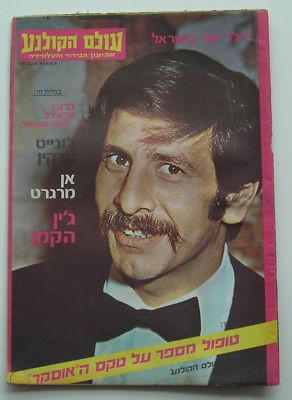
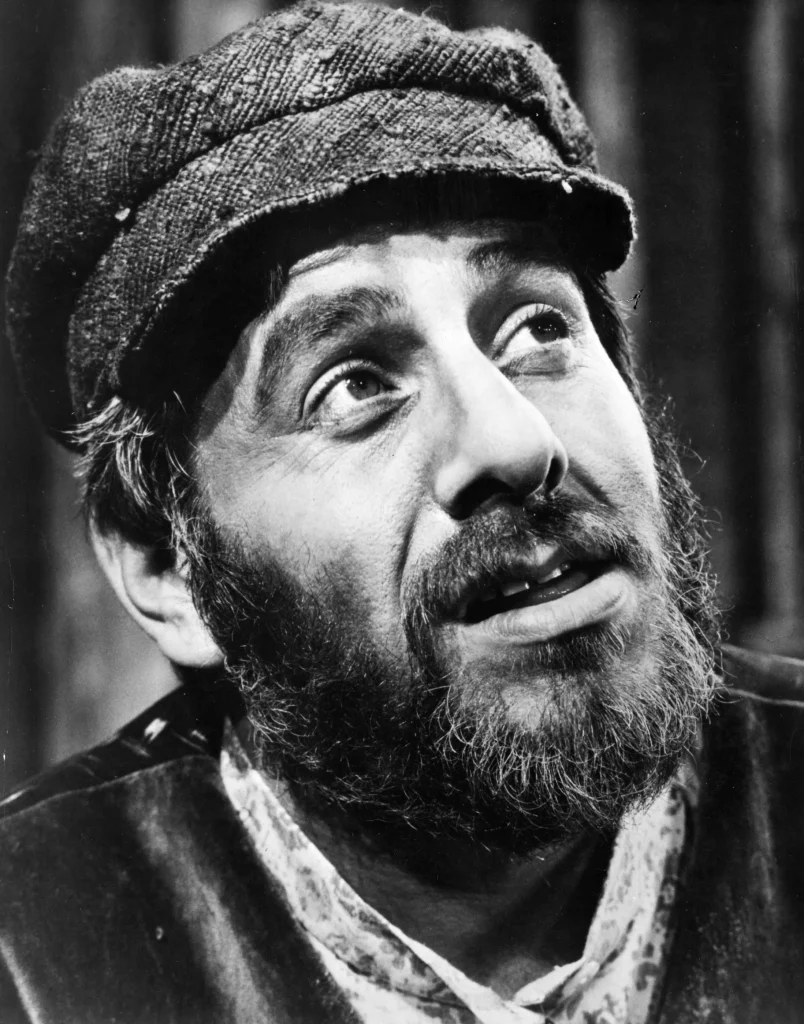
Topol returned to London in the role in 1983, and toured extensively in the US in the late 1980s, when Rosalind Harris, who played the eldest of his five daughters in the film, played his wife. He faced Broadway at last in 1990. When he played Tevye again at the London Palladium in 1994, he was still only 58. By then, the production and performance – enshrined by contract in Boris Aronson’s Chagall-inspired designs and Jerome Robbins’s brilliant but increasingly overfamiliar choreography – showed signs of creakiness. But Irving Wardle once again hailed Topol’s Tevye as “a living memorial to the comic genius of a tragic people”.
This version toured in Europe, Japan and Australia. Ten years later, Topol and Fiddler returned to Australia, as well as New Zealand, and a farewell American tour soon followed. He played Tevye for the last time in Boston, Massachusetts, on 15 November 2009.
His background had validated the performance. Born in Tel Aviv, Topol was the son of parents who had fled Poland in the 1930s – Jacob, a plasterer who had fought in the Haganah against the British in the war of independence, and Rel (nee Goldman), a seamstress. Like many Israelis of his generation, Topol served in the army in the Sinai campaign, in the six-day war in 1967 (he left the cast of Fiddler at Her Majesty’s theatre, London, for that campaign) and in the Yom Kippur war of 1973.
In the army, Topol, who had two younger sisters, joined an entertainment troupe and then started his own satirical revue company, Batzal Yarok (“The Spring Onion” – “To convey the idea of something fresh, sharp and spicy,” he said). One of his fellow comedians was Galia Finkelstein, who shared his background in the Labour movement and whom he married at the Mishmar David kibbutz in 1956.
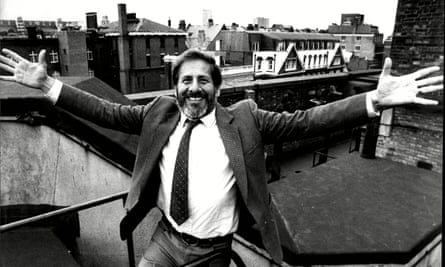
Prior to his army service Topol had trained and worked as a printer after leaving school aged 14. He had never considered becoming a professional actor until, after a spell with the Cameri theatre in Tel Aviv, he joined the new Haifa municipal theatre in 1961. His leading roles there included Petruchio in The Taming of the Shrew, Azdak in Bertolt Brecht’s The Caucasian Chalk Circle and Jean in Eugène Ionesco’s Rhinoceros, which the playwright hailed as the best production ever of his absurdist, surreal play.
He was already well known for the character of Sallah Shabati, an immigrant weighed down with troubles and children who somehow overcomes all adversity. This dry run for Tevye featured in his army revues and a 1964 film (his third) that broke all box-office records in Israel and was nominated for a best foreign-language film Oscar.
International stardom followed in Melville Shavelson’s Cast a Giant Shadow (1966), a war drama about Israel’s struggle for independence, with Kirk Douglas as the American-born colonel David “Mickey” Marcus. Topol played an Arab sheikh, and underlined his versatility by playing a Russian deserter posing as a Slav interpreter in J Lee Thompson’s Before Winter Comes (1969), alongside David Niven, John Hurt and Anthony Quayle.
Still, when he came to London for Fiddler, he spoke hardly a word of English, and was tutored by the Royal Shakespeare Company voice coach Cicely Berry. He later embarked on a happy association with the Chichester Festival theatre, where he played Azdak again (completely bald) in 1969; the Peter Ustinov role of a match-making general in R Loves J, a musical version of Ustinov’s Romanoff and Juliet, with songs by Julian More and Alexander Faris, in 1973; and Othello, with Keith Michell as Iago, in 1975, presenting the tragic Moor, he said, as “a man of the desert, an Arab, blackened by the blazing sun”.
An attempt to follow the success of Fiddler with another musical scripted by Stein, this time with songs by Stephen Schwartz, The Baker’s Wife, foundered on the road and never reached Broadway. And his later film career never eclipsed Fiddler, though he appeared as Brecht’s Galileo in Joseph Losey’s 1974 memorial record of Charles Laughton’s version for the American Film theatre; as the scientist Dr Zarkov in Flash Gordon (1980); and as Milos Columbo, a roguish Greek turncoat, in For Your Eyes Only (1981), opposite Roger Moore’s James Bond.
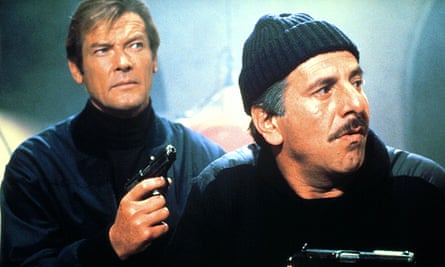
His television work included an incomplete project to film all the books of the Bible; The House on Garibaldi Street (1979), about the capture of Adolf Eichmann, with Martin Balsam and Janet Suzman; and the 1983 mini-series The Winds of War, and its sequel, War and Remembrance, in 1987.
Topol’s last appearance in London was in the autumn of 2008, when he played the Maurice Chevalier role of the old roue Honoré in a delightful revival of Gigi by Alan Jay Lerner and Frederick Loewe in the Open Air theatre at Regent’s Park. As of old, he held the audience in the palm of his hand and discharged his two big numbers – Thank Heavens for Little Girls and I Remember It Well – with a laconic, sideways-on delivery and a generous dose of his trademark confidential charm.
His vivid autobiography, Topol By Topol, was published in 1981, and he compiled a treasury of Jewish jokes and wisdom, To Life! (1994), illustrating both books with his own deft line drawings.
Although he kept a house in London and travelled widely, Topol spent half the year at home in Tel Aviv. He helped to found the Jordan River Village, a holiday camp in lower Galilee for chronically ill children of all ethnic and religious backgrounds, which opened in 2012.
Galia and their children, Omer, Adi and Anat, survive him.
Chaim Topol, actor, born 9 September 1935; died 8 March 2023


